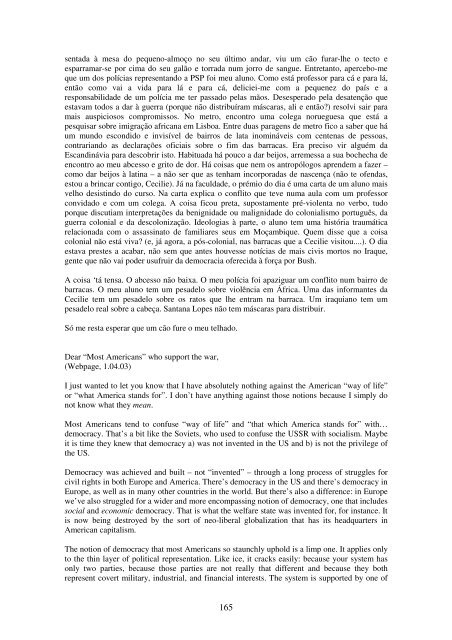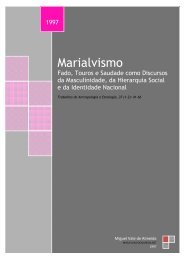Bem-vind@! Este é um “livro” - Miguel Vale de Almeida
Bem-vind@! Este é um “livro” - Miguel Vale de Almeida
Bem-vind@! Este é um “livro” - Miguel Vale de Almeida
Create successful ePaper yourself
Turn your PDF publications into a flip-book with our unique Google optimized e-Paper software.
sentada à mesa do pequeno-almoço no seu último andar, viu <strong>um</strong> cão furar-lhe o tecto e<br />
esparramar-se por cima do seu galão e torrada n<strong>um</strong> jorro <strong>de</strong> sangue. Entretanto, apercebo-me<br />
que <strong>um</strong> dos polícias representando a PSP foi meu aluno. Como está professor para cá e para lá,<br />
então como vai a vida para lá e para cá, <strong>de</strong>liciei-me com a pequenez do país e a<br />
responsabilida<strong>de</strong> <strong>de</strong> <strong>um</strong> polícia me ter passado pelas mãos. Desesperado pela <strong>de</strong>satenção que<br />
estavam todos a dar à guerra (porque não distribuíram máscaras, ali e então?) resolvi sair para<br />
mais auspiciosos compromissos. No metro, encontro <strong>um</strong>a colega norueguesa que está a<br />
pesquisar sobre imigração africana em Lisboa. Entre duas paragens <strong>de</strong> metro fico a saber que há<br />
<strong>um</strong> mundo escondido e invisível <strong>de</strong> bairros <strong>de</strong> lata inomináveis com centenas <strong>de</strong> pessoas,<br />
contrariando as <strong>de</strong>clarações oficiais sobre o fim das barracas. Era preciso vir algu<strong>é</strong>m da<br />
Escandinávia para <strong>de</strong>scobrir isto. Habituada há pouco a dar beijos, arremessa a sua bochecha <strong>de</strong><br />
encontro ao meu abcesso e grito <strong>de</strong> dor. Há coisas que nem os antropólogos apren<strong>de</strong>m a fazer –<br />
como dar beijos à latina – a não ser que as tenham incorporadas <strong>de</strong> nascença (não te ofendas,<br />
estou a brincar contigo, Cecilie). Já na faculda<strong>de</strong>, o pr<strong>é</strong>mio do dia <strong>é</strong> <strong>um</strong>a carta <strong>de</strong> <strong>um</strong> aluno mais<br />
velho <strong>de</strong>sistindo do curso. Na carta explica o conflito que teve n<strong>um</strong>a aula com <strong>um</strong> professor<br />
convidado e com <strong>um</strong> colega. A coisa ficou preta, supostamente pr<strong>é</strong>-violenta no verbo, tudo<br />
porque discutiam interpretações da benignida<strong>de</strong> ou malignida<strong>de</strong> do colonialismo português, da<br />
guerra colonial e da <strong>de</strong>scolonização. I<strong>de</strong>ologias à parte, o aluno tem <strong>um</strong>a história tra<strong>um</strong>ática<br />
relacionada com o assassinato <strong>de</strong> familiares seus em Moçambique. Quem disse que a coisa<br />
colonial não está viva? (e, já agora, a pós-colonial, nas barracas que a Cecilie visitou....). O dia<br />
estava prestes a acabar, não sem que antes houvesse notícias <strong>de</strong> mais civis mortos no Iraque,<br />
gente que não vai po<strong>de</strong>r usufruir da <strong>de</strong>mocracia oferecida à força por Bush.<br />
A coisa ‘tá tensa. O abcesso não baixa. O meu polícia foi apaziguar <strong>um</strong> conflito n<strong>um</strong> bairro <strong>de</strong><br />
barracas. O meu aluno tem <strong>um</strong> pesa<strong>de</strong>lo sobre violência em África. Uma das informantes da<br />
Cecilie tem <strong>um</strong> pesa<strong>de</strong>lo sobre os ratos que lhe entram na barraca. Um iraquiano tem <strong>um</strong><br />
pesa<strong>de</strong>lo real sobre a cabeça. Santana Lopes não tem máscaras para distribuir.<br />
Só me resta esperar que <strong>um</strong> cão fure o meu telhado.<br />
Dear “Most Americans” who support the war,<br />
(Webpage, 1.04.03)<br />
I just wanted to let you know that I have absolutely nothing against the American “way of life”<br />
or “what America stands for”. I don’t have anything against those notions because I simply do<br />
not know what they mean.<br />
Most Americans tend to confuse “way of life” and “that which America stands for” with…<br />
<strong>de</strong>mocracy. That’s a bit like the Soviets, who used to confuse the USSR with socialism. Maybe<br />
it is time they knew that <strong>de</strong>mocracy a) was not invented in the US and b) is not the privilege of<br />
the US.<br />
Democracy was achieved and built – not “invented” – through a long process of struggles for<br />
civil rights in both Europe and America. There’s <strong>de</strong>mocracy in the US and there’s <strong>de</strong>mocracy in<br />
Europe, as well as in many other countries in the world. But there’s also a difference: in Europe<br />
we’ve also struggled for a wi<strong>de</strong>r and more encompassing notion of <strong>de</strong>mocracy, one that inclu<strong>de</strong>s<br />
social and economic <strong>de</strong>mocracy. That is what the welfare state was invented for, for instance. It<br />
is now being <strong>de</strong>stroyed by the sort of neo-liberal globalization that has its headquarters in<br />
American capitalism.<br />
The notion of <strong>de</strong>mocracy that most Americans so staunchly uphold is a limp one. It applies only<br />
to the thin layer of political representation. Like ice, it cracks easily: because your system has<br />
only two parties, because those parties are not really that different and because they both<br />
represent covert military, industrial, and financial interests. The system is supported by one of<br />
165



